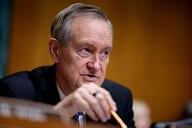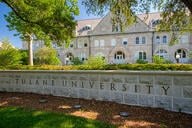You have /5 articles left.
Sign up for a free account or log in.
UPDATE: University of California, Berkeley, officials announced Thursday afternoon that Ann Coulter can come to the campus to give a talk May 2 and won't have to wait until the fall to do so.
Earlier this week, Berkeley officials called off an appearance by Coulter for next week, saying that it could not assure safety. Coulter had vowed to come as scheduled on April 27, and Berkeley's decision was widely criticized -- even by many who find Coulter's rhetoric offensive and demeaning.
Nicholas Dirks, chancellor at Berkeley, told reporters at a press briefing that the university expanded its search for a suitable location for Coulter to appear during the current semester and found "an appropriate, protectable venue," one that he declined to identify until more details are resolved about the event. Dirks stressed that the university is committed to both free speech and also to safety.
"This university has an unwavering commitment to the First Amendment of the Constitution, which enshrines and protects the right of freedom of speech and freedom of expression. As the home of the Free Speech Movement, we fully support the right and ability of our students to host speakers of their choice, and we believe that exposing students to a diverse array of perspectives is an inherent and inseparable part of our educational mission," Dirks said. "We also have an unwavering commitment to providing for the safety and well-being of speakers who come to campus, our students and other members of our campus and surrounding communities."
Dirks also said that the decision to call off the April 27 event was based on "very specific intelligence regarding threats that could pose a grave danger to the speaker, attendees and those who may wish to lawfully protest the event."
This is a developing story and will be updated. The material that follows was published before Thursday afternoon's announcement.
The University of California, Berkeley, told students who planned to bring writer Ann Coulter to campus next week that they could not do so, saying the university has "been unable to find a safe and suitable venue" for the event.
Coulter, who revels in controversy, announced that she would show up next week anyway.
The controversy is likely to add to an intensifying debate over free speech on American college campuses. Just this week, Auburn University tried to prevent Richard Spencer, a white nationalist, from appearing, but let him speak when a federal judge gave the university no choice. Auburn, like Berkeley, cited safety concerns. And in February, Berkeley called off a speech by Milo Yiannopoulos, then a Breitbart editor known for inflammatory campus rhetoric, amid a violent protest by "anti-fascist" groups from off campus and a large nonviolent protest by students. Berkeley had, until the protest turned violent, defended the right of Yiannopoulos to appear. Also this spring, students shouted down Charles Murray at Middlebury College (forcing him to speak via live stream) and prevented Heather Mac Donald from having an audience at Claremont McKenna College or answering questions at the University of California, Los Angeles.
Berkeley officials have been concerned about violent reactions to speakers not only because of the Yiannopoulos clashes but because of at times violent protests in the city of Berkeley in recent weeks.
Reports have circulated on social media that various groups would use Coulter's appearance at Berkeley for another round of violent protests. A post on Reddit, referring to the "anti-fascist movement" that stormed the campus before the Yiannopoulos visit, said, "Ann Coulter will be speaking at UC Berkeley on the 27th of April. These Antifa clowns are going to be their [sic] to take cheap shot at us. Help us cold cock some antifa ***s."
A letter from two Berkeley vice chancellors, Scott Biddy and Stephen Sutton, to the Republican campus group that invited Coulter expressed regret over having to call off her visit. "We regret this outcome -- especially given our unqualified support for our students’ right to bring speakers of their choosing to the university, and our deep commitment to the values and principles embedded in the First Amendment of the U.S. Constitution," the letter said.
But the letter explained why university officials believed they had no choice.
"The campus retains responsibility for ensuring safety and security during such events. This includes the safety and security of invited speakers, of those who attend such events, of our community neighbors and of those who choose to exercise their own First Amendment rights by lawfully protesting the presence of speakers with whom they disagree. In this context, we greatly appreciate recent public comments by your spokespeople, who have offered full support for increased security measures in and around high-profile events," the letter said. "As a general matter, the timing of an event, as well the location and nature of the venue, play an important role when it comes to the safety and security of the speaker, attendees, our community neighbors, as well as individuals engaged in lawful protest. In the wake of events surrounding the planned appearance by Milo Yiannopoulos in February, as well as several riots which have occurred in recent weeks in the city of Berkeley, we have increased our scrutiny regarding the time and location of high-profile speakers so that these events can go forward unimpeded."
Coulter on Twitter denounced the university and said she would appear -- and planned to sue Berkeley. She had been scheduled to talk about immigration.
Young Americans for Freedom, one of the groups that has sponsored Coulter's visit, issued a statement accusing the university of making its decision based on dislike of Coulter's politics. The statement compared Berkeley leaders to Kim Jong-un, the North Korean dictator.
Prior to the event being called off, an editorial in The Daily Californian, the student newspaper, questioned the value of bringing Coulter to campus, noting that she attracts attention with her rhetoric but doesn't engage in sustained discussion with those who might disagree with her views.
"With her past incendiary remarks toward Muslims, Mexicans and many other communities of color, Coulter has shown an unwillingness to partake in intellectual discourse," the editorial said. "Simply put, she would astonish us if she sparked meaningful dialogue on campus."




